Fostering Animal Wellness in Rural Nicaragua
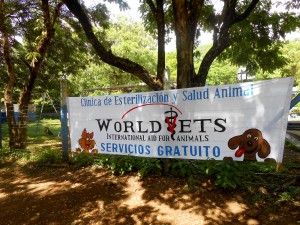
Photo: Katie Horn/World Vets
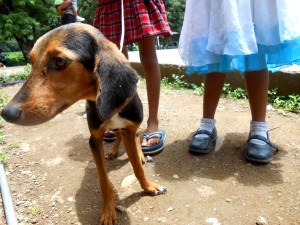
Photo: Katie Horn/World Vets
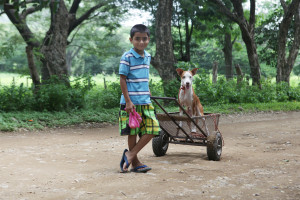
Photo: Van Olsen Photography
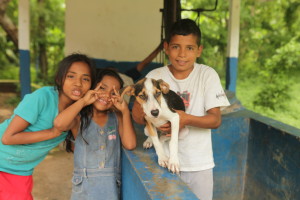
Photo: Van Olsen Photography
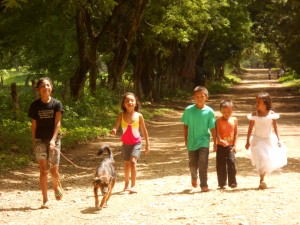
Photo: Katie Horn/WorldVets
As World Vets team pulled up to the local school, which was to be our clinic site, piglets and chickens were busy foraging on the school grounds. Unafraid of our presence they continued about their daily routine. As we proceeded to set up our work stations we were greeted by a donkey that happened to preside over a family’s small agricultural plot next door. He provided constant reminders of his presence, “hee – haw”, that enticed many of us to go see him throughout the work day.
As veterinary services got underway, children and grown men dressed in their Sunday’s best began to form a line around the registration desk. Dogs were brought to us in handbags, on carts and wheelbarrows and cats surprisingly enough were carried in on string leashes or in cardboard boxes. Half came to us to receive spay/neuter surgery and the other half for health consultations
Until recently World Vets had not set up a direct veterinary service campaign in this particular community. Located 25 minutes or so outside of the main town of San Juan del Sur, the rural community of Escamequita is a world of its own. In contrast to town, houses are scattered over considerable distances and made from all kinds of materials; from wood to metal scrap and/or brick. All animals, including dogs, pigs, chickens and turkeys roam free, yet everyone knows which house they belong to. Furthermore, potable water may only be accessible from a well and during the rainy season the only road to and from Escamequita may be washed out, limiting contact with town and its subsequent products and services.
Even though World Vets had never visited the area before, the animals of Escamequita have quite a history with World Vets and the services we have provided in San Juan del Sur over the years. This has much to do with concerned and kind hearted expatriates who also live in the area. Without hesitation, they have rallied local households and loaded up their trucks with animals, accompanied by their owners, to receive our services, wherever they would be provided. The animals brought to us in their vehicles were always the ones that had the worse body conditions and needed the most TLC from our teams.
After years of their dedication and demand for veterinary care, it made perfect sense to bring our services directly to them. Our recent campaign in Escamequita has acted to harness this growing awareness of animal welfare and responsible pet ownership, especially amongst the young population. Many animals from the original “truck loads” were first brought to us to receive spay/neuter surgery. Now we happily welcome them back for follow up medical treatments. And wouldn’t you know it; they were some of the healthiest looking bunch during our recent campaign!
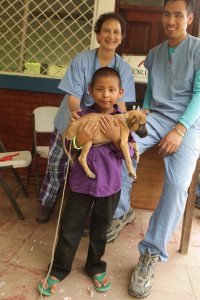
Photo: Van Olsen Photography
Our visit to Escamequita has also served to further promote the concept of animal wellness, specifically for new pet owners who had not previously sought out our services either due to distance and/or logistics. In consultations we saw one young boy who brought his puppy for a check up and to receive preventative health treatments. This is the first step we explained, to being a responsible pet owner, and his father proudly agreed.
More than anything our veterinary services in rural communities such as Escamequita provide the means for individuals to care for and be responsible pet owners. It is a huge misconception that people in foreign countries simply do not care for their animals. They do! This young boy is but one example.




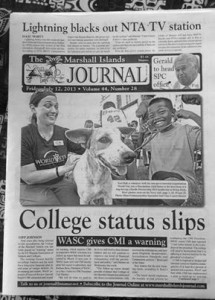 MAJURO, Marshall Islands (July 4, 2013) Tori Hall, a volunteer with the non-governmental organization World Vets, lets a Marshallese child listen to the heartbeat of a dog during a Pacific Partnership 2013 health fair.
MAJURO, Marshall Islands (July 4, 2013) Tori Hall, a volunteer with the non-governmental organization World Vets, lets a Marshallese child listen to the heartbeat of a dog during a Pacific Partnership 2013 health fair.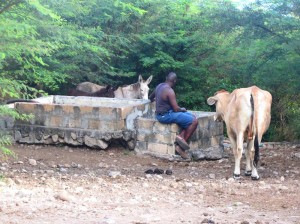 This year World Vets is continuing its assistance to the Department of Agriculture in St. Eustatius; a small island located in the Netherland Antilles in the Caribbean. In 2012 World Vets sent a preliminary team to the island where they conducted a pilot project. The objective of their visit was to help the island contain its ever growing animal population. Our team provided castrations to both donkeys and small animals. They also visited the island`s livestock facilities to assess overall health and identify any prevalent ailments.
This year World Vets is continuing its assistance to the Department of Agriculture in St. Eustatius; a small island located in the Netherland Antilles in the Caribbean. In 2012 World Vets sent a preliminary team to the island where they conducted a pilot project. The objective of their visit was to help the island contain its ever growing animal population. Our team provided castrations to both donkeys and small animals. They also visited the island`s livestock facilities to assess overall health and identify any prevalent ailments.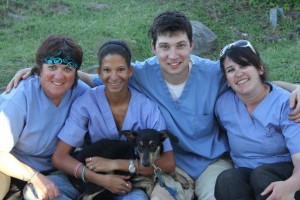 In 2013 World Vets will send two follow up teams. These teams will further contribute to the goal of having an animal population that is sustainable for the island. One team will address small animal health and population and another to address livestock and the roaming donkey population. Both projects have volunteer opportunities available:
In 2013 World Vets will send two follow up teams. These teams will further contribute to the goal of having an animal population that is sustainable for the island. One team will address small animal health and population and another to address livestock and the roaming donkey population. Both projects have volunteer opportunities available: